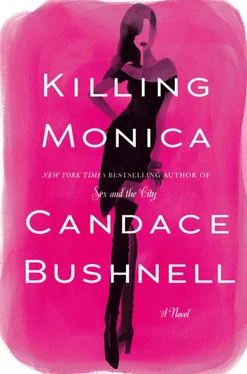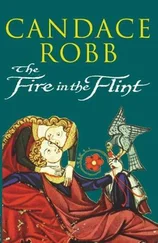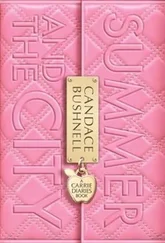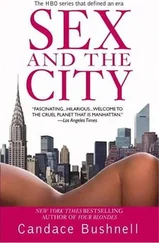And then she frowned. Like the first billboard, this Monica also lacked her leg.
Despite the circumstances, the sight caused her to convulse with mad, wild laughter. She suddenly had a crazy urge to call SondraBeth Schnowzer to tell her that Monica’s leg was still missing.
SondraBeth was the only person in the world who would have appreciated the hilarity of the situation.
The car rounded the corner, and Pandy took one last look at the billboard as her laughter turned to tears. And for the first time in a long time, Pandy remembered how different it had once been, nine years ago when it was new and fresh and exciting…
And how it had all started when she’d said those four fateful words:
“I want that girl.”
I WANT that girl!” Pandy had exclaimed.
She was in Los Angeles, sitting in the backseat of a town car, when she’d seen the billboard. It was hanging over Sunset right near the Chateau Marmont, where Pandy was headed after another dispiriting round of auditions for the lead role of Monica.
All of a sudden, the car had come around the curve after Doheny, and there she was: masses of hair fluttering behind her like the American flag; shining green-gold eyes looking out over the flattened landscape of the universe. In her arms was a golden wolf pup.
Then the tagline: WHAT IF DOGS CAN SEE STARS, TOO?
“Her!” she screamed, pointing up at the billboard as they passed by. “That girl.”
The driver laughed. “She’s a model.”
“So what?”
Handsome and genial, the driver laughed again. “It’s the same old story. Everyone who comes to Hollywood has the same dream. They think they’re going to discover some unknown talent. Some gorgeous model who turns out to be a movie star in disguise.”
Pandy smiled. “And isn’t that your story, too? A movie star in a gorgeous male model’s body?”
The driver glanced back at her in his rearview mirror. He laughed toothily, appreciating her humor. “I guess you could say that.”
For a second she could see The Girl’s reflection in his mirrored shades.
And then she was gone, and in the next moment, the driver was pulling into the driveway of the Chateau Marmont.
The studio had flown Pandy out to Los Angeles for the casting of Monica, and Pandy had been given the star treatment: a car and driver at her disposal, and bungalow 1 at the Chateau. Bungalow 1 may or may not have been the room where John Belushi died; the staff was vague on the particulars. In any case, the large, dark apartment was enormous. It included two bedrooms, a kitchen, and a terrace shielded from the pool by a chain-link fence woven with thick greenery. Not surprisingly, given its history, there was something unsettling about the place. The first evening, sitting in the front room on the orange fuzzy-caterpillar couch, the TV an arm’s length away, Pandy had thought, You could go crazy here .
Well, she wouldn’t be the first, she thought now, getting out of the car and slotting her key into the private door that led to the pool and the bungalow. Throwing her stuff onto the caterpillar chaise, she rushed upstairs and flung open the windows, looking past the brown haze on the horizon and trying not to think about the word “no.” A word that was to showbiz as smog was to LA.
“No.”
“No?”
“Noooo.”
And, of course:
“NO!”
That last “no” had been hers. Delivered just that afternoon at the end of another fruitless casting session, when the studio people tried to convince her to let Lala Grinada play Monica. Lala had the limpest blond hair Pandy had ever seen, and she looked like someone who would starve herself under the slightest bit of pressure. And she was British.
No, Pandy thought. Lala Grinada was not going to play Monica. She leaned out the window and, by craning her head sharply to the left, discovered that she could just catch a glimpse of The Girl on the billboard.
And then, as if it were a sign from the Hollywood gods themselves, the buzzer rang and Pandy rushed downstairs, breathlessly opening the door to discover a waiter holding a tray with a bottle of champagne. Propped against the glittering condensation on the silver ice bucket was a gray envelope bearing the name PJ Wallis . Written in block letters and underlined twice.
Pandy shook off the droplets and ripped open the envelope. Inside was a single heavy card, on which a note was written in the same block lettering: Hope you’ve enjoyed your stay in LA so far. Looking forward to our meeting tomorrow! It was signed with two letters: PP.
Peter Pepper, the head of the studio that was making Monica .
Who calls himself PP— Pee-Pee ? Pandy wondered as she slid the letter back into the envelope.
PP, she knew, wanted to talk about casting.
This was good. She wanted to talk about casting, too.
The part of Monica had been offered to several well-known actresses, all of whom had turned it down for various reasons. One claimed she didn’t understand the character. Another was worried that Monica wasn’t likable. Yet another insisted she couldn’t use bad language, take drugs, or be rejected by a man on-screen.
No actress who was any good wanted to play Monica. And the ones who wanted to play her weren’t good enough.
Pandy picked up the phone. “Can I have two vodka cranberries with ice and a bacon cheeseburger, medium rare?”
“Just one person,” she clarified. Then: “ One person. Two drinks. I’m thirsty.”
Pandy put the phone down.
“I need that girl,” she said aloud.
* * *
The next morning, before the meeting with PP, Pandy risked her life crossing Sunset to get to the newsstand across from the Chateau. The road forked oddly, and anything in the intersection was potential roadkill. Pandy darted, stopped, darted. She imagined herself as John Belushi in Animal House .
She bought a pile of magazines and two packs of cigarettes, just in case.
* * *
“I hear you haven’t liked anyone so far,” PP said, leaning back in his conference room chair.
PP was a squarish man with a squarish head and smooth dark hair that resembled the sort of plastic coif favored by action figures. He had thick, blocky thighs that strained against the fine fabric of his black suit pants. He always sat with his legs apart.
“If you’re referring to Lala Grinada, you’re right,” Pandy said boldly.
PP—Pee-Pee—scanned the faces around the conference table, taking his time to pause at each one before he said, “Lala Grinada would never be right for this. Whose bad idea was that?” He tilted back in his chair.
“The agency,” someone said.
“Actually, there is someone I’d like to see,” Pandy interjected. “She looks right for the part, anyway.”
“Looks are something,” agreed one of the other executives—a second- or third-in-command, Pandy guessed. “Who is it?”
“Her.” Pandy laid out the array of magazines, turning to the pages that featured The Girl in a variety of ads—lingerie, fine jewelry, and perfume.
“ Her? ” someone asked incredulously.
“Is she the one with the—”
“The name? Yes. That ridiculous name that no one can remember.”
“SondraBeth Schnowzer.”
“How would that look in the titles?”
“Terrible.”
“What kind of name is that, anyway?”
“Austrian, maybe. Like Schwarzenegger.”
“ Schnowzer ,” someone said in Arnold Schwarzenegger’s voice.
There was benign laughter around the table.
“Sorry, darling,” someone said to Pandy.
Читать дальше












